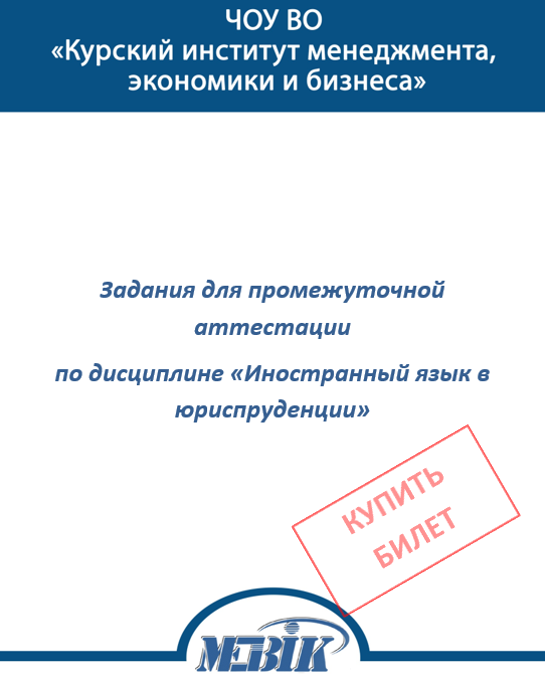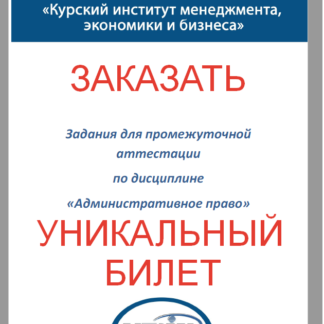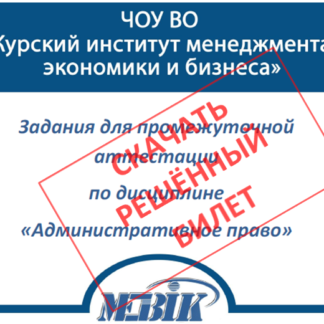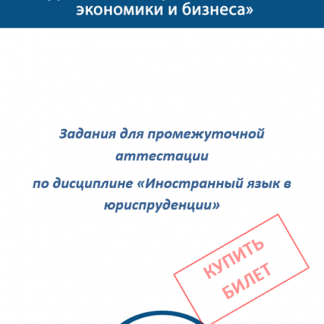Билет 2 Иностранный язык в юриспруденции
Первоначальная цена составляла 900₽.450₽Текущая цена: 450₽.
Билет №2 для промежуточной аттестации по дисциплине «Иностранный язык в юриспруденции» в Курском институте менеджмента, экономики и бизнеса. – Курск: типография МЭБИК, 2023 год
Артикул 0016385
БИЛЕТ 2
Task 1. Read and translate the text “George Washington”
George Washington
George Washington had been the obvious choice to be the first president of the United States, and indeed, many people had supported ratification of the Constitution on the assumption that Washington would be the head of the new government. By all measures, Washington proved himself a capable, even a great, president, helping to shape the new government and leading the country skilfully through several crises, both foreign and domestic.
Washington, like many of his contemporaries, did not understand or believe in political parties, and saw them as fractious agencies subversive of domestic tranquillity. When political parties began forming during his administration, and in direct response to some of his policies, he failed to comprehend that parties would be the chief device through which the American people would debate and resolve major public issues. It was his fear of what parties would do to the nation that led Washington to draft his Farewell Address.
The two parties that developed in the early 1790s were the Federalists, who supported the economic and foreign policies of the Washington administration, and the Jeffersonian Republicans, who in large measure opposed them. In foreign affairs, both sides wanted the United States to remain neutral in the growing controversies between Great Britain and France, but the Federalists favoured the English and the Jeffersonians the French.
Washington set out his vision of what would make the United States a truly great nation. He called for men to put aside parties and unite for the common good. The United States must concentrate only on American interests, and while the country ought to be friendly and open its commerce to all nations, it should avoid becoming involved in foreign wars. The United States must “act for ourselves and not for others”.
Many Americans, especially in subsequent generations, accepted Washington’s advice as gospel, and in any debates between neutrality and involvement in foreign issues would invoke the message as dispositive of all questions. Not until 1949, in fact, would the United States again sign a treaty of alliance with a foreign nation.
Task 2. Complete the following sentences.
- Many people supported ratification of the Constitution on the assumption that … .
- Washington proved himself a capable president helping … .
- His contemporaries didn’t understand or believe in political parties and saw them as … .
- G. Washington failed to comprehend that … .
- The two parties that developed in the early 1790s were … .
- The Federalists supported … .
- Both parties wanted the United States … .
- G. Washington wanted the United States to concentrate on … .
- The country ought to be friendly and open its … .
- Many Americans, especially in subsequent generations, accepted … .
Task 3. Fill in the gaps with the correct preposition.
- Americans have the great pride … their Constitution.
- The American Constitution is the oldest still … force in the world.
- Under the American Constitution all power belongs … the people.
- All governments and governmental groups must operate … constitutional guidelines.
- The first ten amendments … the Constitution stated fundamental rights of any American.
- State legislatures must conform … the state constitution.
- A great deal of power is put … the hands of president.
- US president is assisted in Administration … a Cabinet of 12 members.
- Cabinet secretaries correspond to European ministers, they are heads of different departments and directly and fully responsible … President.
- The Supreme Court watches … the other two branches.
- Congress has the power to fix the number of judges sitting on the Court, but it cannot change the powers given … the Supreme Court … the Constitution itself.
- A decision of the Supreme Court cannot be appealed … any other court.
- All other cases which reach the Court are appeals … lower courts.
- One third of the Senators are elected every two years … six-year terms of office.
- A Senator must be … least 30 years old, a citizen of the US for nine years and a resident of the state from which he is elected.
- The Senate is elected … a population basis.
- Congressmen … a committee are experts … certain fields.
- The representatives in Congress must please the people in their districts, or they will find themselves … a job.
- The legislative branch takes the lead … formulating the structure and duties of the other two branches.
- There are light specific limitations … Congress’s powers noted in Article I Section 9 of the Constitution.
- A statute can be about any subject that law touches … .
- The statute also contains a message to some legal authority, giving instructions about carrying … the law.
- Today the Democrats are thought of as associated … labour and the Republicans with business.
- The Department of State advises the President … foreign relations, the Department of Justice deals … legal matters.
Task 4. Produce the whole sentence in English.
- The Constitution may be defined as a system or body (основных принципов, согласно которым государство устанавливается и управляется).
- The American Constitution for over 200 years has provided the basis for (политическую стабильность, свободу всех граждан, экономический рост и социальный прогресс).
- The Constitution (установила федеральную систему) with a strong central government.
- (Система сдержек и противовесов обеспечивает) that no one branch of the government would dominate the others.
- (Поправки были внесены в) the American Constitution twenty-six times.
- The amendments to the Constitution (право на судебное разбирательство судом присяжных, право быть защищенным против необоснованных преследований и арестов, конфискация имущества) stated the fundamental rights to any American.
- State governments arrange such affairs as (поддержание порядка, образования детей).
- Laws (влияющие на повседневную жизнь граждан) are enforced by police in the cities and towns.
- Agents of the Federal Bureau of Investigation track down criminals who (пересекают государственную границу или нарушают федеральные законы).
- A decision of the supreme Court (не может быть обжаловано) to any other court.
- Although the three branches are presumably coequal, (законодательная ветвь) takes the lead in (формирование структуры и обязанностей двух других ветвей).
- Some statutes are long, (сложные и важные) some are short.
- The President has the authority (назначать глав всех департаментов исполнительной власти) and agencies, together with hundreds of other high- ranking officials.
- The important function of the President is that he can grant full or conditional pardon to (любому, обвиненному в нарушении федерального закона, сократить срок приговора) and reduce fines.
- During the impeachment process the President is to (подвергнутся судебному разбирательству в Сенате) with the Chief Justice as the judge.
- At every level of political life the Republican and Democratic parties (борются за господствующее положение в обществе).
- The Republicans place more emphasis on private enterprise and (часто обвиняют демократов в создании слишком либерального правительства).
Grammar Revision: The Passive Voice
Put the verb in brackets into the correct passive tense.
- Before the Normans conquered England different areas of the country (govern) by different systems of law which often (adapt) from those of various invaders who had settled there; roughly speaking, Dane law (apply) in the north, Mercian law around the midlands, and Wessex law in the south and west.
- Each law (base) largely on local customs and these customs varied from place to place.
- Representatives of the king (send) out to the countryside to check local administration and (give) the job of adjudicating in local disputes, according to local law.
- By about 1250 a “common law” (produce) that ruled the whole country and could (use) to predict what the courts might decide in a particular case.
- The principles behind this “common law” still (use) today in creating case law which in fact often (know) as common law.
- Case law comes from the decisions that (make) by judges in the cases before them, but case law (not, make) up with the decisions of juries.
- The idea is that once a decision (make) on how the law applies to a particular set of facts, similar facts in later cases (treat) in the same way.
- The judges listen to the evidence and the legal argument and then a written decision (prepare).
- The explanation of the legal principles on which the decision (made) (call) the ratio decidendi – Latin for the “reason for deciding”.
- If the decision of a lower court (appeal) to a higher one, it (change) by the higher court if they feel the law wrongly (interpret) by the lower court.
- As a rule decisions always (not, make) on the basis of only one previous case; usually several different cases (offer) in support of each sides view of the question.
- The independence of Judiciary (guarantee) by the Act of Settlement, 1700.
Билет выполнен и был сдан на положительную оценку. Билет можно скачать сразу после покупки. Для покупки билета поместите его в корзину и оформите заказ. После оплаты ссылка на файл придет Вам на электронную почту. Заказать уникальный билет, который будет выполнен специально для Вас, можно здесь: ВЫПОЛНЕНИЕ УНИКАЛЬНОГО БИЛЕТА ПО АНГЛИЙСКОМУ ЯЗЫКУ для МЭБИК.




